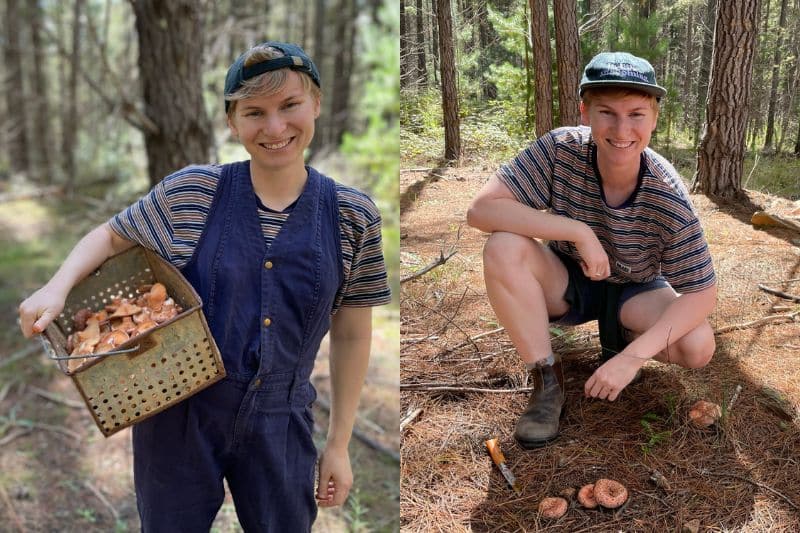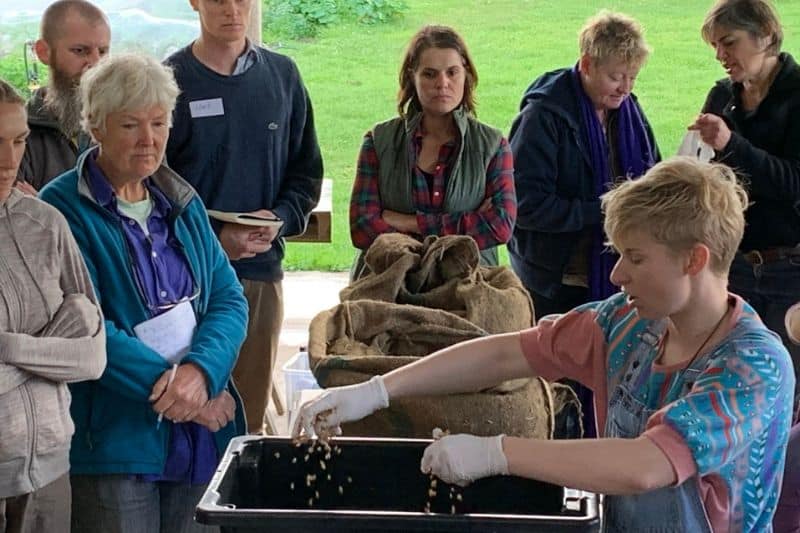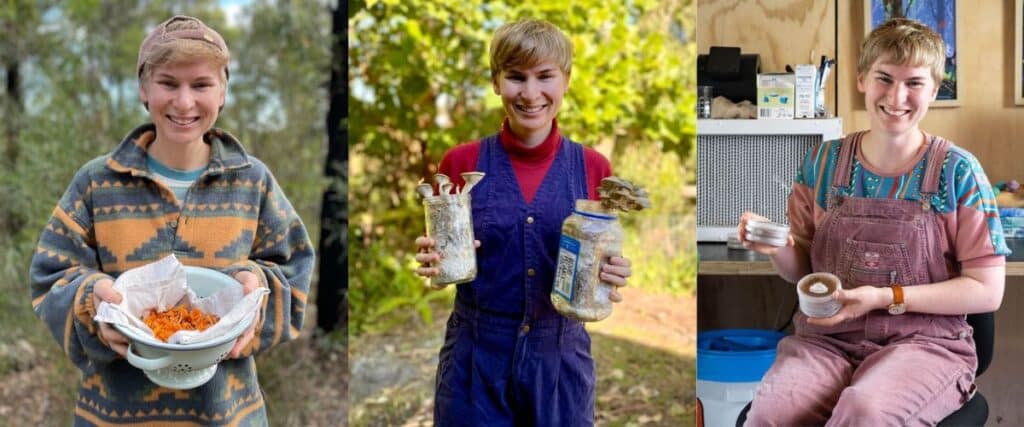In the realm of nature’s marvels, there exists a fascinating world that often escapes our notice—the kingdom of fungi. Within this captivating domain, Australian scientist, author, and editor named Marita Smith emerges as a beacon of knowledge and passion.
Marita Smith, a scientist, author, and editor, has dedicated her life to exploring the captivating world of mushrooms. As the Founder of Milton Mushrooms on the scenic New South Wales coast, Marita has cultivated an array of gourmet mushrooms that have delighted local restaurants and farmers markets.

Her farm, however, goes beyond cultivation, embodying a vibrant community that celebrates the magic of fungi and the interconnectedness of the mycelial network. Marita Smith’s expertise and passion have garnered attention from various platforms, including Milkwood Permaculture and Autostraddle, where she shares her wisdom with readers. With a focus on sustainable farming, Marita actively collaborates with organisations like the Australian Mushroom Growers Association, the Australian Food Sovereignty Alliance, and the Slow Food South Coast movement.
In an exclusive interview with Hive Life magazine, Marita Smith unveils the secrets of her mushroom-filled world, inviting readers to embrace the transformative power of these extraordinary organisms.

How Did You Develop Your Passion for Fungi?
I studied science at university, focusing on chemistry and biology. I found great enjoyment in what I learned during that time. After completing my studies, I took a gap year and travelled abroad. Through a programme called WWOOF, which involves working on organic farms, I had the opportunity to gain hands-on experience and learn from exceptional individuals. This experience was truly eye-opening as it revealed alternative ways of living, working, and approaching life.
Upon returning to Australia, I settled back home and enrolled in a vocational school called TAFE to study political culture. During this period, I began working at a local restaurant that had a lovely market garden. They cultivated a significant portion of the produce used in their kitchen, creating a wonderful connection between growing and cooking. [Recognising] my enthusiasm for science, the restaurant encouraged me to participate in a mushroom course, and I immediately fell in love with it.

From Being a Scientist and Author, What was Your Journey Like Becoming the Founder of Milton Mushrooms?
I [chose] a different path, focusing on organic products instead of academics. After a mushroom course, I was captivated by permaculture and science. I turned part of my space into a small lab, growing mushrooms with simple methods. I sold them locally and to restaurants where I worked. It was slow at first, but I saw potential.
Realising it was tough to solely rely on mushroom farming, I focused on medicinal varieties like Lion’s Mane and Reishi.

To [supplement income], I started an editing business, mainly offering academic services. It let me earn while pursuing my mushroom passion.
Ultimately, I gave myself permission to explore and follow my passions, despite seeming unconventional. It brought immense joy and opportunities to meet amazing people. Life is short, and this journey was unimaginable to miss.

How Do You Balance Your Various Roles and Find Time for Each of Your Passions?
When things get busy, like during the end of the semester, editing [takes priority] and other activities are put on hold. But during slower periods, I can enjoy fun activities like exploring new cultures or writing. It’s like keeping multiple pots simmering and gradually rotating them over time.
There has been a [big change] in my pursuits. I used to grow medicinal mushrooms and create drink blends like spiced Reishi cacao and Golden Lion Turmeric. However, changes in Australian regulations due to the growing popularity of mushrooms made us realise the gaps in testing laws. So we had to stop growing those mushrooms. But now we’re focusing on education, foraging, and raising awareness about mushrooms and their role in the environment, which is really exciting.
I [appreciate the diversity of my work], even though editing dry documents can sometimes feel monotonous. But this allows me to dedicate a few weeks to other engaging tasks like culturing and getting mushroom supplies.

What is Unique About Milton Mushrooms’ Cultivation, Sustainability, and Community Engagement Practices?
We’re a small mushroom farm in Australia, different from the large-scale ones. We grow various oyster mushrooms and do some photography too. Our unique approach lets us offer a mix of freshly grown, local mushrooms to our customers, creating an amazing experience.
We’ve also started growing medicinal mushrooms, giving Australians local alternatives. This transition lets us be involved in every stage of the mushroom’s lifecycle, allowing us to educate customers about their taste and benefits.

We actively collaborate with local groups like schools to teach mushroom cultivation. We create personalised grower buckets and host workshops and walks to generate excitement and dispel any concerns about mushrooms. Our efforts help people appreciate and use mushrooms in gardening and sustainability practices.
We go beyond cultivation by doing extensive lab work. We start cultures from wild mushrooms, grow them on agar in Petri dishes, and send samples to a lab for genetic testing. This helps us identify the types of mushrooms found in Australia and learn about their diversity.

How do You Collaborate with Chefs to Incorporate Mushrooms in Their Culinary Creations?
When I started working at a restaurant, I had the [opportunity] to communicate directly with the chefs. I would inform them about the mushrooms I was growing and bring some in for them to try. They would [experiment] with different recipes, going beyond the usual sautéed mushrooms. It was fascinating to see the creative dishes local chefs would come up with.
Eventually, I expanded my mushroom supply to other restaurants and farmers markets. It was always enjoyable to witness the chefs’ innovative approaches, whether they incorporated Asian fusion with an Australian twist or stuck to traditional recipes. Cooking with mushrooms offers endless possibilities, far beyond the common perception of them being just a side dish or a simple pasta ingredient. The chefs truly transformed the mushrooms into amazing culinary creations, and I was thrilled to be a part of it.

What are Some of the Challenges You Face as a Mushroom Farmer, and How Do You Overcome Them?
Starting a career as a mushroom farmer is tough. Like market gardeners, income isn’t guaranteed, and extreme weather can ruin crops. Australian summers, in particular, pose a challenge to mushroom growth. It’s disheartening when expected harvests fall short due to such circumstances. Financial viability is a concern, especially for young farmers aiming to build resilient communities. Working harder doesn’t always solve everything, as competing with large-scale growers is tough.

Often, a day job is necessary to sustain the farm and personal expenses. Convincing others to start their own farms is difficult, given better-paying alternatives. However, I found a way to adapt by offering unique services like mobile workshops, education programmes, and researching Australian mushrooms. Adapting to these challenges is crucial for my farm’s sustainability.

What is an Exciting Discovery You Made During Your Time Studying Fungi?
One interesting find is the presence of bioluminescent fungi called Ghost fungus. They can be found in different parts of Australia, and this winter has been particularly fruitful for them. It’s always a delight to come across these unique mushrooms, and people get just as excited because they are quite rare. However, they bear a resemblance to edible oyster mushrooms, leading to unfortunate incidents where people mistakenly consume them and end up in emergency.
While wild oyster mushrooms are not abundant here, we have a plentiful supply of bioluminescent mushrooms that look similar. One of our accomplishments in the past year was establishing a culture line of these mushrooms based on a local population. It has been amazing to share this culture medium with other growers, who have reported back with great photos and stories of growing these glowing mycelium blocks.

What Role Do Local Organisations Play in Supporting Your Work and Promoting Sustainable Farming Practices?
We’re fortunate to have organisations like the Australian Mushroom Growers Association, Australian Food Sovereignty Alliance (AFSA), and Slow Food South Coast supporting our work and promoting sustainable farming practices.
Slow Food has been with me since the beginning, providing a yearly producer’s grant that helped me purchase a dehydrator for my mushrooms. They also facilitate networking among growers through a producers directory.

On a larger scale, the Mushroom Growers Association offers support, resources, and annual conferences for growers of all sizes. They assist with testing and provide recommendations on labs.
The AFSA focuses on supporting farmers across the country, particularly in areas like meat processing, where access to resources can be challenging. They advocate for fair legislation and provide assistance to small-scale growers.
It’s reassuring to have these organisations backing us as small growers, offering support, networking opportunities, and resources. I’ve met incredible people through these organisations who have not only benefited my business but also become lifelong friends. Having these resources and connections is invaluable.

How Do You Envision the Future of Mushroom Cultivation and Its Potential Impact on Sustainable Food Systems?
Mushrooms are extraordinary and can be grown anywhere, requiring minimal space compared to traditional agriculture. They can be stacked vertically or spread out in warehouses, making them accessible to urban centres and a large consumer base. Mushroom cultivation has great potential for fresh food production on a small footprint.
Additionally, research on mycelium’s ability to remediate pollutants and create biodegradable materials for packaging and construction is promising. Companies like Ecovative are already growing innovative products. The future may see mushrooms used not only as a food source but also in textiles, packaging, and building materials, offering sustainable alternatives to plastic.
Imagine living in a house insulated with mycelium panels, having a lampshade made of mycelium, and enjoying fresh mushrooms grown outside. The possibilities are vast, including various medicinal applications. Exciting times lie ahead.

What Are Your Future Plans for Milton Mushrooms?
In the future, we plan to continue running Milton Mushrooms. It’s hard to believe that we’ll soon celebrate 10 years on the farm, which is very exciting. Although we’re not currently supplying fresh mushrooms to the market, we are focused on education and workshops. We want to [inspire] people to slow down and appreciate the natural environment, even during simple activities like walking the dog.
We [encourage] observing fungi and understanding how they contribute to ecosystems and soil health. Our goal is to get people excited about mushrooms and their benefits. Whether they enjoy eating, photographing, or studying them, we offer something for everyone. We also maintain a cultural library to provide mushroom cultures to other growers in Australia. We believe in sharing cultures freely to support others. [Additionally], we enjoy exploring the forest and searching for mushrooms.

Related Articles
8 Sustainability Startups in Australia to Watch





